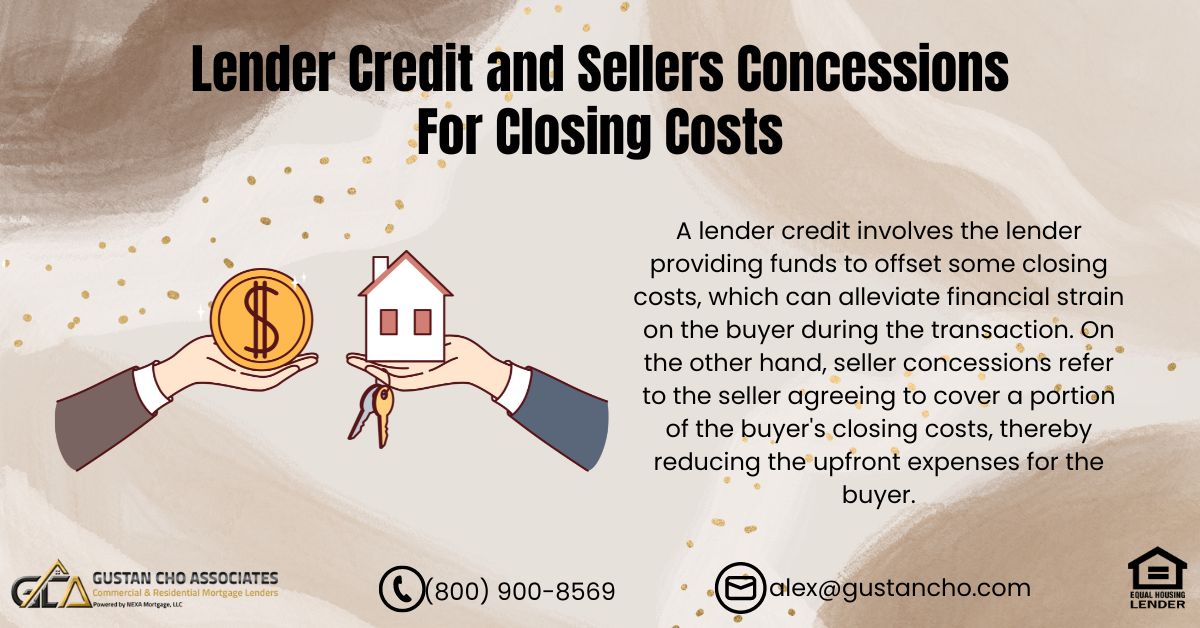This blog will explore the concepts of lender credit and seller concessions about closing costs. When securing a home purchase mortgage loan or refinancing, various fees and expenses come into play. For instance, when purchasing a home, the buyer must provide a down payment, which varies based on the chosen mortgage loan program. In the subsequent sections, we’ll delve into the mechanics of lender credit and seller concessions, elucidating how they facilitate covering closing costs.
A lender credit involves the lender providing funds to offset some closing costs, which can alleviate financial strain on the buyer during the transaction. On the other hand, seller concessions refer to the seller agreeing to cover a portion of the buyer’s closing costs, thereby reducing the upfront expenses for the buyer.
What Are The Down Payment Requirements on Home Loans?
FHA loans mandate a 3.5% down payment for buyers, though those with a credit score below 580 must make a 10% down payment. If you’re looking to buy a home, you can get an FHA loan through HUD even if you have a credit score as low as 500, as long as you make a down payment of 10%.
Conventional loans necessitate either a 3% or 5% down payment, while USDA and VA loans don’t require any down payment. Non-QM and alternative mortgage programs typically demand a down payment ranging from 10% to 30%. Additionally, buyers may sometimes benefit from lender credit and seller concessions. Speak With Our Loan Officer About Lender Credit and Sellers Concessions
What Is The Difference Between Down Payment Versus Closing Costs on a Home Purchase?
A down payment is a requirement from mortgage lenders for home purchases. It’s important to note that lender credit and sellers concessions cannot be applied toward the down payment. However, both FHA and Conventional loans allow gift funds to be used for this purpose. This blog will detail how homebuyers can manage closing costs in home purchase transactions.
Lenders Allow Lender Credit and Sellers Concessions For Homebuyer’s Closing Costs
Lender credit and sellers concessions are allowed on mortgage loan programs. Most homebuyers at Gustan Cho Associates do not have to worry about paying out of pocket for closing costs. Lender credit and sellers concessions can only be used for closing costs and not for the down payment. The down payment on a home purchase needs to come from the buyer. Lender credit, and sellers concessions cannot be used toward the down payment.
Is Concession the Same as Credit?
Lender credit and sellers concessions typically refer to the same concept in real estate transactions. They both involve the seller assisting the buyer, often covering some of the buyer’s closing costs or prepaid expenses. These terms are often used interchangeably in the real estate industry.
How Does the Down Payment and Closing Costs Work For a Home Purchase?
Numerous diligent American families dedicate significant effort to accumulate funds for a down payment when buying a home. In today’s challenging economic climate, where many individuals manage their finances from paycheck to paycheck, saving can pose a considerable challenge.
Fortunately, most homebuyers are not concerned about covering closing costs, as these expenses can often be addressed through lender credit and seller concessions. Instead, their focus remains primarily on securing the necessary down payment for their home purchase.
Down Payment and Closing Costs on Home Purchase
The two types of costs in a home purchase are the following:
- Down Payment
- Closing Costs
Who Pays For Closing Costs on a Real Estate Transaction?
The down payment remains a fixed percentage of the purchase price. At the same time, closing costs, including lender credit and sellers concessions, are subject to variation based on the property’s location and the borrower’s credit profile.
Borrowers with lower credit scores may incur additional origination charges. Those with credit scores below 600 may face discount point charges as part of the lender’s loan level pricing adjustment (LLPA).
Property types, such as condos, two to four-unit multi-family homes, and manufactured homes, can lead to higher origination charges due to loan-level pricing adjustments. Closing costs also fluctuate depending on the mortgage loan program, with non-QM loans typically carrying higher closing costs than government programs.
Can Discount Points be Paid by the Seller?
The seller can pay discount points through a mechanism known as Seller Concessions. This involves the seller offering to cover some of the buyer’s closing costs, which can include discount points. Alternatively, the lender may offer a Lender Credit to cover the cost of discount points, reducing the financial burden on the buyer at closing. The buyer, seller, and lender can negotiate specific arrangements for covering discount points during the purchase agreement process.
What are Closing Costs?
Every mortgage transaction has closing costs. Whether it is a home purchase or a refinance mortgage transaction, there are closing costs the mortgage borrower is liable for. John Strange, a senior loan officer at Gustan Cho Associates, explains the difference between the down payment and closing costs and what you can use seller concessions to cover costs in a home purchase as follows:
In every mortgage transaction, including both home purchases and refinance deals, there are inevitable closing costs that the borrower must cover. A senior loan officer at Gustan Cho Associates, John Strange emphasizes the distinction between the down payment and closing costs, as well as the utilization of lender credit and sellers concessions to offset expenses in a home purchase:
A homebuyer must come up with a down payment on a home purchase. There are ways where a home buyer does not have to come up with the closing costs on a home purchase.
Closing costs need to be paid by the mortgage borrower. In a home purchase transaction, closing costs can be paid if the home buyer gets a seller’s concession by the home seller to cover part or all of the home buyer’s closing costs. Sellers’ concessions cannot be used towards the down payment on a home purchase. Any seller concession overages need to go back to the home seller.
Lender Credit and Sellers Concessions in Home Purchase Closing Costs
Closing costs, typically the borrower’s responsibility, can be alleviated through seller concessions in a home purchase scenario. This means the home seller agrees to contribute a portion or all of the buyer’s closing costs. It’s important to note that seller concessions cannot be redirected towards the down payment.
Any seller concession overages must be returned to the seller. Lender Credit can also be utilized to cover closing costs, providing further flexibility for the buyer.
What Happens To Overages in Seller Concessions?
The seller is prohibited from offering the excess seller concession directly to the buyer as cash or any form of kickback. Buyers must exercise caution and refrain from requesting excessive seller concessions, including lender credit and sellers concessions. Excess seller concessions can be used to purchase points, thus reducing mortgage rates.
Furthermore, seller concessions can cover the upfront FHA mortgage insurance premium instead of rolling it into the FHA loan balance. Pre-Qualify for an FHA Loan Today
Down Payment Requirement on Home Purchase
The down payment criteria vary depending on the loan program. FHA loans mandate a minimum 3.5% down payment. VA and USDA loans don’t necessitate any down payment. First-time home buyers must provide a 3% down payment for conventional loans.
Per Fannie Mae and Freddie Mac guidelines, individuals who have not owned a home in the past three years are classified as first-time homebuyers. Additionally, it’s important to consider potential financial assistance options such as lender credit and seller concessions.
Down Payment Requirements on Conventional Loans
The down payment criterion is 5% for conventional loans for owner-occupied residences. While many home buyers manage to gather the down payment for their purchase, they often need more funds for closing costs.
Depending on the jurisdiction of the property, closing costs may surpass the down payment amount.
Fortunately, if home buyers secure the mandated down payment, they needn’t fret about covering closing costs. These expenses can be offset through lender credit and seller concessions. The extent of permissibility of seller concessions hinges on the specific mortgage loan program in play.
Lender Credit Versus Mortgage Rates
The two ways are that a home buyer does not have to come up with closing costs on a home purchase—lender credit and seller concessions. We have covered seller concessions in previous blogs, so we will not cover them in detail.
How Do Seller Concessions From Home Sellers Work?
A seller concession, also known as seller credit or seller concession, is when a home seller provides a credit to the buyer at closing to cover some or all of the buyer’s closing costs. This can include appraisal, inspection, and title insurance fees. Essentially, the seller agrees to reduce the net proceeds they receive from the sale to assist the buyer with their upfront expenses.
Both seller concessions and lender credit can be valuable tools for homebuyers, especially those who are cash-strapped or seeking to minimize their upfront expenses.
Seller concessions are often negotiated as part of the home purchase agreement. They can be a significant financial benefit to the buyer, especially when they have limited funds for closing costs.
On the other hand, lender credit is a similar concept but involves the lender providing credit to the borrower to cover closing costs. This credit is typically offered in exchange for a slightly higher interest rate on the mortgage loan. Essentially, the borrower borrows more money to cover the closing costs, which they will repay over time with interest.
How Do Appraisers Adjust Seller Concessions?
When you’re closing on a home, there are certain expenses you’ll need to pay, known as closing costs. These expenses include charges for the title, real estate and transfer taxes, appraisal and underwriting fees, home inspection, attorney fees, and other expenses associated with the home’s closing.
According to regulations, the maximum concession sellers allow is 6% of the home’s purchase price. While most sellers are open to offering a seller concession to facilitate the deal, some may be reluctant.
Alternatively, sellers may choose not to provide a seller concession to the home buyer and instead offer lender credit towards closing costs. Lender credit occurs when a mortgage company offers credit toward closing costs instead of a higher rate.
How Do Lender Credit and Sellers Concessions Work For Closing Costs?
Lenders offer lender credit and sellers concessions to borrowers: lender credits allows them to receive financial assistance toward closing costs. In contrast, sellers concessions can further alleviate expenses by enabling sellers to contribute, often in the form of credits, towards these costs. For example, consider the following scenario:
- If the borrower got quoted a mortgage rate of 5.25% on a 30-year fixed-rate mortgage loan
- And he or she does not have enough money for closing costs
- The lender can cover the closing costs with a lender credit
- But a higher mortgage rate, like 5.5%
- Lender credit towards closing costs can only cover the borrower’s closing costs.
Overages in lender credit cannot go to the borrower or be used for the down payment. Any overages in seller concessions must go back to the home seller.
Examples of Closing Costs on Home Purchase and Refinance Transactions
Examples of closing costs are the following:
- title charges
- recording charges
- transfer stamps
- loan level pricing adjustments
- credit report fees
- discount points
- origination fees
- processing fees
- underwriting fees
- doc fees
- attorneys fees
- pre-paid ( escrow for two months of insurance and two months of property taxes)
- one-year homeowners insurance premium, flood insurance premium, appraisal fees
- other inspection fees
Closing costs include third-party costs and fees the mortgage loan borrower can charge in home-buying. Homebuyers who cannot get a seller concession to cover their closing costs for one reason or another can get a lender credit to cover their closing costs. We will discuss what lender credit is and how lender credit works in the next paragraph.
What Is a Lender Credit To Cover Closing Costs?
A mortgage lender can offer a lender credit to the mortgage borrower to cover the mortgage borrower’s closing costs. Many mortgage lenders will advertise that by choosing them. The mortgage lender will cover all closing costs for borrowers.
All banks and mortgage lenders can offer lender credit to all borrowers to cover the borrower’s closing costs. However. lender credit is offered by lenders for a higher mortgage rate.
This type of advertising is often misleading because borrowers think they are getting a lifetime deal by choosing the lender that offers no closing costs via an advertisement. You often see ads by lenders that they will pay for the home buyer’s home appraisal if you choose them and that they will pay for all of the borrower’s closing costs.
Lender Credit and Sellers Concessions: Can Lenders Help Pay Closing Costs
This is true, but all lenders can offer a lender credit, and the borrower can pay most or all closing costs with a lender credit. However, these lenders do not tell you that if the lender offers you a lender credit for closing costs, the mortgage rates you will get will be much higher than the par rate you will get if you pay the closing costs yourself.
Often, a lender credit will jack up a mortgage interest rate by 0.50% percentage points, where you will pay tens of thousands of dollars throughout a 30-year fixed-rate mortgage loan for just getting a few thousand dollars in a lender credit. There is no free lunch in the mortgage business; any bank or mortgage company can give you a lender credit instead of a higher mortgage rate.
Update To This Blog On Lender Credit and Sellers Concessions: This mortgage blog article post was updated on March 6, 2024. If you want to purchase a home and have the down payment but not the closing costs, please contact me at 800-900-8569 or text us for a faster response. Or email us at gcho@gustancho.com. You can also visit us at Gustan Cho Associates at www.gustancho.com.
FAQ: Lender Credit and Sellers Concessions For Closing Costs
If you want to purchase a home and have the down payment but not the closing costs, contact us now!










We need to do a FHA with 3.5% down. It will be in my husband’s name only as I don’t work consistently. His credit score is 618 and our loan broker says this won’t be approved.